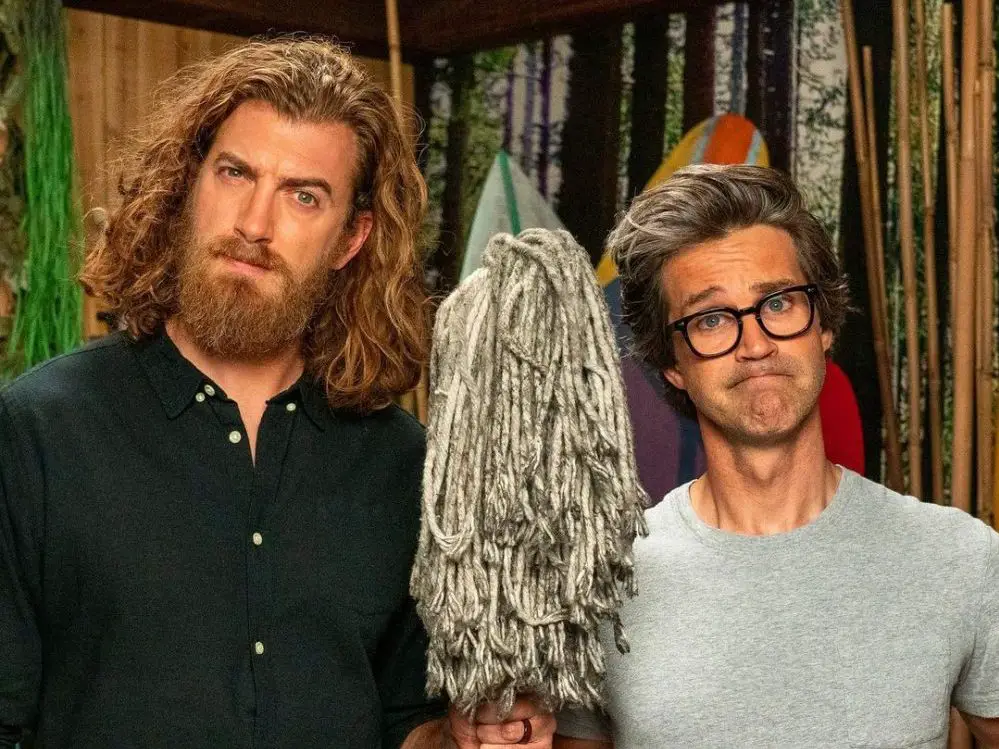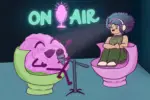Very few people can say that they’ve worked with the same person exclusively for 10 years, but Rhett McLaughlin and Link Neal can. Even fewer people can say that they’ve known their business partner since first grade, but these YouTube legends hold that distinction as well. They are known to the internet as Rhett & Link and are a guaranteed staple in the memories of people who grew up watching YouTube.
The pair’s humble beginnings in 2011 centered around an Abraham Lincoln Chia Pet, hence the title of their first series, “Good Morning Chia Lincoln.” After the tragic death of Chia Lincoln and a move to Los Angeles, Rhett and Link began their most popular show to date, “Good Mythical Morning.” The daily talk show has 17 million subscribers. With their newfound success, they created the Mythical Kitchen and Good Mythical MORE channels, along with their paid content page, Mythical Society.
They have since expanded into a production company, Mythical Entertainment, to produce these shows and invest in other creators. Most notably, the pair saved Smosh, the hit YouTube group with 25 million subscribers, after the shutdown of Defy Media. What’s particularly lovely about their creator investments — especially compared to other production companies — is that they specifically invest in creators who reflect their values. While other brands invest in whoever is most popular, McLaughlin and Neal support truly good people.
Despite reaching mogul status on YouTube, the pair still produces their podcast, “Ear Biscuits.” Rather than being an overproduced, scripted podcast, the almost 300 episodes of “Ear Biscuits” could not be more casual. McLaughlin and Neal sit at “the round table of dim lighting” and speak honestly and openly with their audience. “Ear Biscuits” has gone through many iterations, but has managed to remain relevant and impactful to their audience.
How It Started
Looking back at the early episodes of “Ear Biscuits” feels like time-traveling back to the early days of YouTube. From 2013 to 2015, McLaughlin and Neal interviewed the most prominent internet creators of the time in order to learn about them beyond their internet personas. They started with comedy creator Grace Helbig, then interviewed everyone from gamers like Markiplier, to authors like John Green, to viral legends like GloZell Green.
In the first episode, McLaughlin says, “We get to make YouTube videos full time, and there are these other people who are doing the same thing — and we always find it fascinating to just talk with them. Talk with them about how they got started doing this, talk with them about who they are.”
At the time, being a YouTube creator was a new concept that was growing in popularity. These creators existed in a space between the world of celebrities and the average person, making them a growing enigma to most. Through early episodes of “Ear Biscuits,” McLaughlin and Neal were helping to bridge that gap. They gave a new look into the lives of those at the center of the YouTuber phenomenon.
How It Went
After taking 2016 off from podcast recordings, McLaughlin and Neal returned to “Ear Biscuits” in 2017 with a more casual format. They still hosted a few guests at the table, but the conversations weren’t structured. Rather than diving into the guest’s personal lives as they did in the early days of “Ear Biscuits,” they allowed the conversation to flow naturally.
This era also fostered another staple of the Mythical community: fan interaction and inclusion. McLaughlin and Neal call their fans Mythical Beasts and have centered their work around them since the beginning. In the first half of 2018, almost all “Ear Biscuits” episodes were focused on answering fan questions or even taking their calls.
By fostering this connection with their fans, McLaughlin and Neal ensure relevance to their audience. Just how people care about their friends’ points of view, the relationship between the pair and their fans strengthens the podcast’s relevance for its listeners. A fan says, “In a way they feel like my closest friends … and this seems like a conversation between the three of us, like maybe, three lifelong friends talking about life for a long time.”
How It’s Going
Beginning in late 2018, “Ear Biscuits” started to reach its final form. The episodes featured only McLaughlin and Neal, who have since coined their opening phrase for each episode: “Welcome to ‘Ear Biscuits,’ the podcast where two lifelong friends talk about life for a long time.” Listening to these episodes lives up to the motto; it feels like the audience is a part of the pair’s friendship and conversations.
This dynamic was amplified in January of 2020 when McLaughlin and Neal began releasing their “Lost Years” series. In their previous work, the pair talked at length about growing up and their time in Los Angeles, but not the time in between. So, in this series, they address their time in college and pre-YouTube experiences, which are characterized by their missionary work for their Christian faith.
What makes the “Lost Years” series so powerful is that McLaughlin and Neal openly address the fact that they have since lost their faith, particularly in the two episodes in which they each describe their “spiritual deconstruction.” They chronicle each interaction, experience and Google search that took them from being devout Baptists to self-described agnostics.
After this, the pair approached “Ear Biscuits” with a new sense of sincerity. While some episodes maintain McLaughlin and Neal’s token humor, every few episodes the men dig deep into their families, marriages and beliefs. This duality shows the freeform aspects of “Ear Biscuits”; the show can go from focusing on McLaughlin’s adventures around North Carolina to Neal’s experience with grief in his family without the hosts or audience missing a beat.
How Fans Feel
“Ear Biscuits” attracts both loyal Rhett & Link fans and new listeners, even after 298 episodes, because it has evolved over its eight years of production. While some podcasts have a set format, fans praise the pair for allowing “Ear Biscuits” to change with the times — and themselves. From interviewing fellow YouTubers to answering fan questions to discussing personal experiences, McLaughlin and Neal have stayed true to themselves and relevant to their audience.
This relevance is rooted in what stands out most to listeners: the pair’s openness and honesty. By addressing what’s happening in the world and in their own lives, McLaughlin and Neal will always be relevant to the fans that tune in because they care about the pair. This is particularly evident in McLaughlin’s one-year update after his spiritual deconstruction episode. In it, he addressed both his personal experiences receiving criticism over his thought processes and his appreciation for not being associated with conservative Christians in current times.
“Ear Biscuits” also deserves recognition for the pair’s positive effect on the YouTube space. Some podcasts have been catalysts for conflict and drama in the creator community, so it’s powerful to listen to two creators who are genuinely good people be honest and kind to each other and their audience. In addition, it’s impactful to listen to two married, white, straight men acknowledge their emotions. McLaughlin and Neal openly talk about their experiences in therapy, their parenting successes and failures and how their marriages have changed over time.
Despite the pair’s status as business powerhouses in the internet sphere, “Ear Biscuits” gives McLaughlin and Neal the ability to stay relatable to their audience. Although by day the pair are investing and creating on a grand scale, the podcast gives them an opportunity to be the Rhett & Link their fans fell in love with: funny, relatable and honest.

















